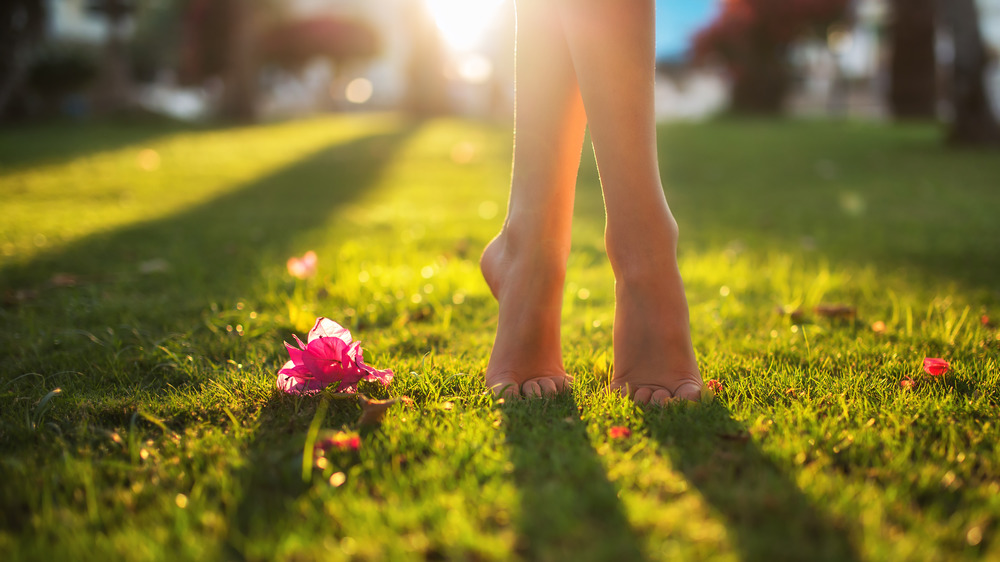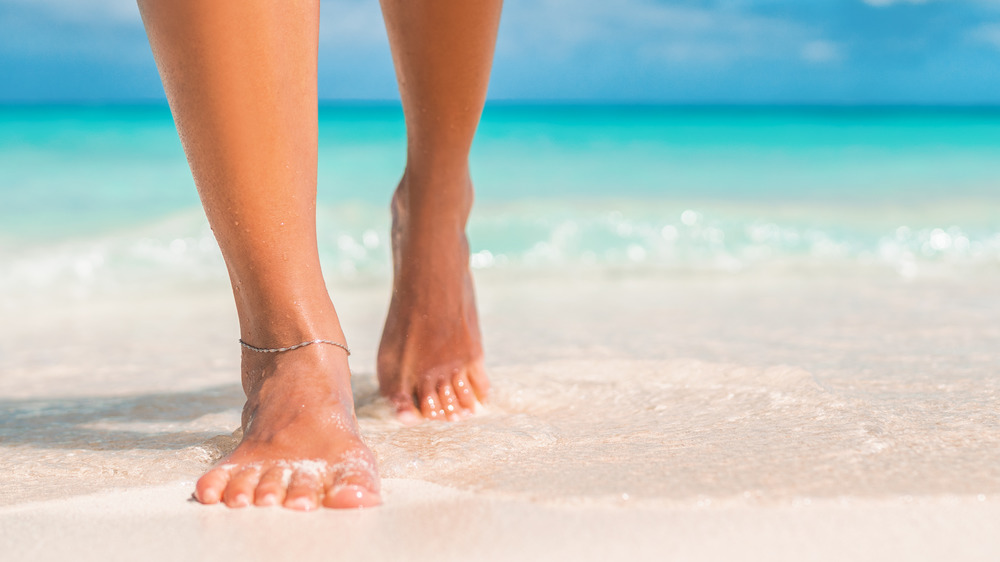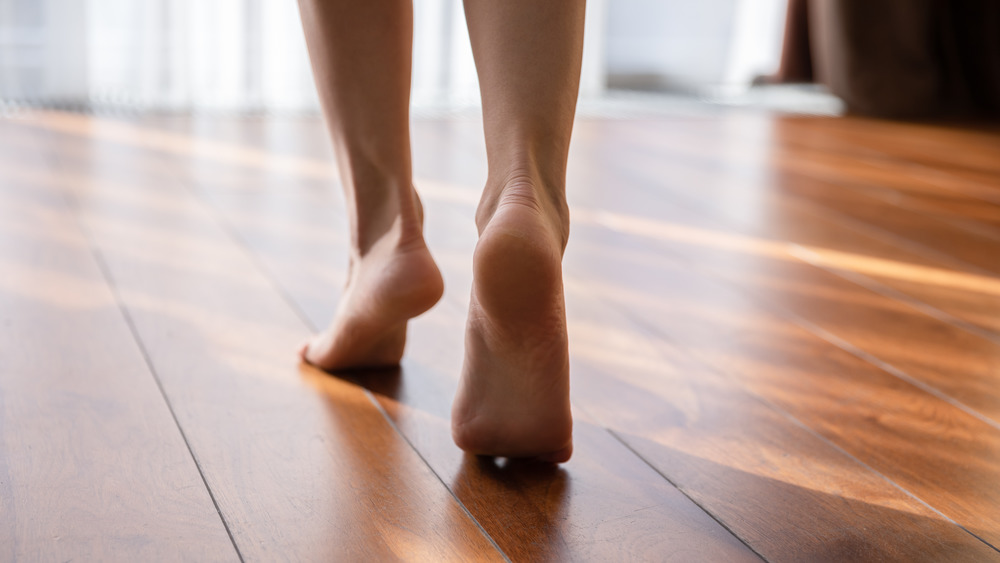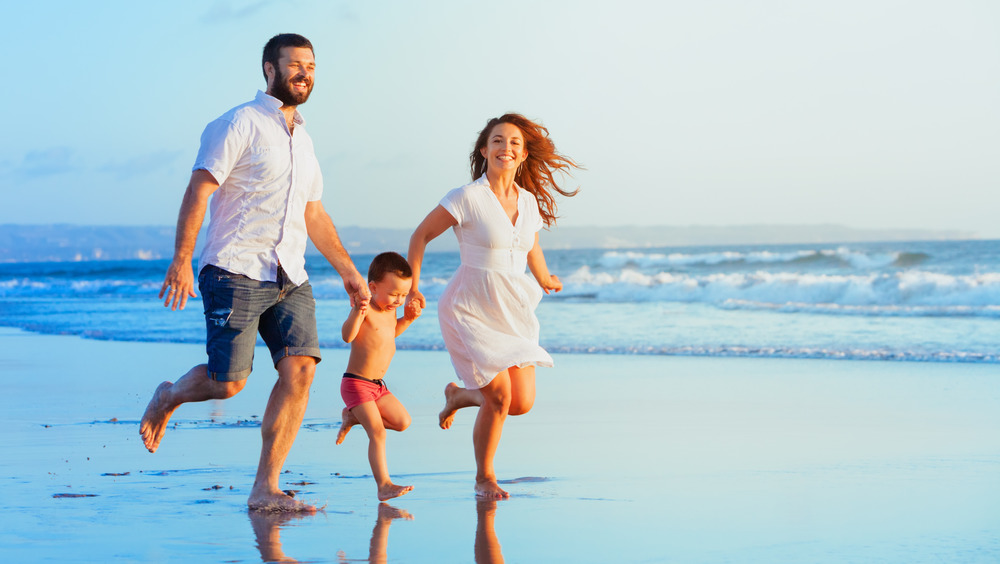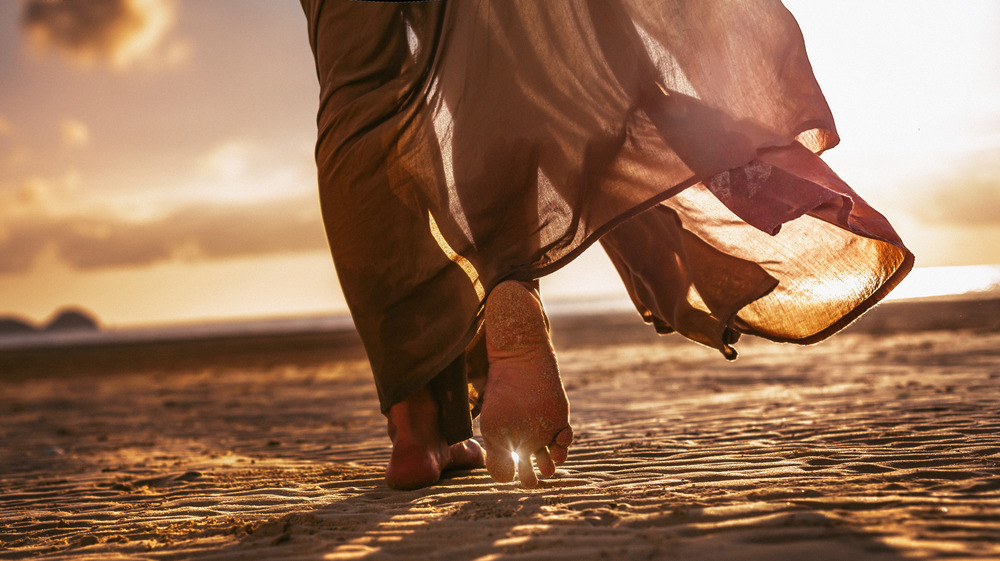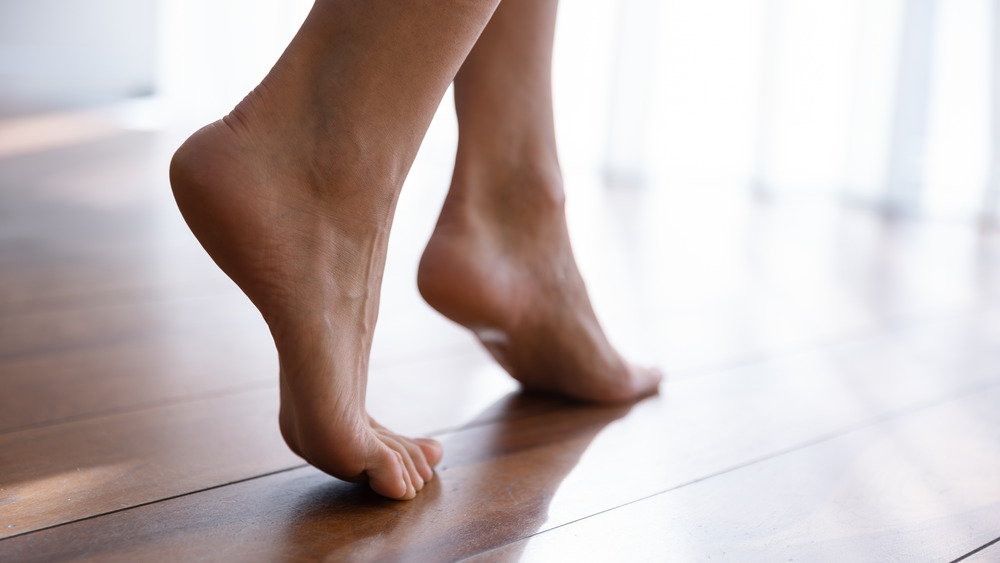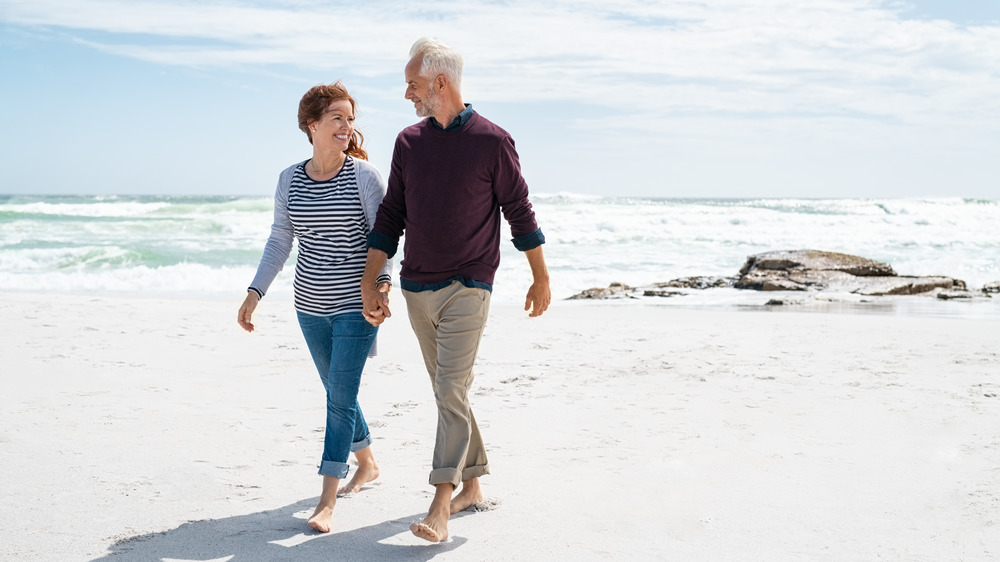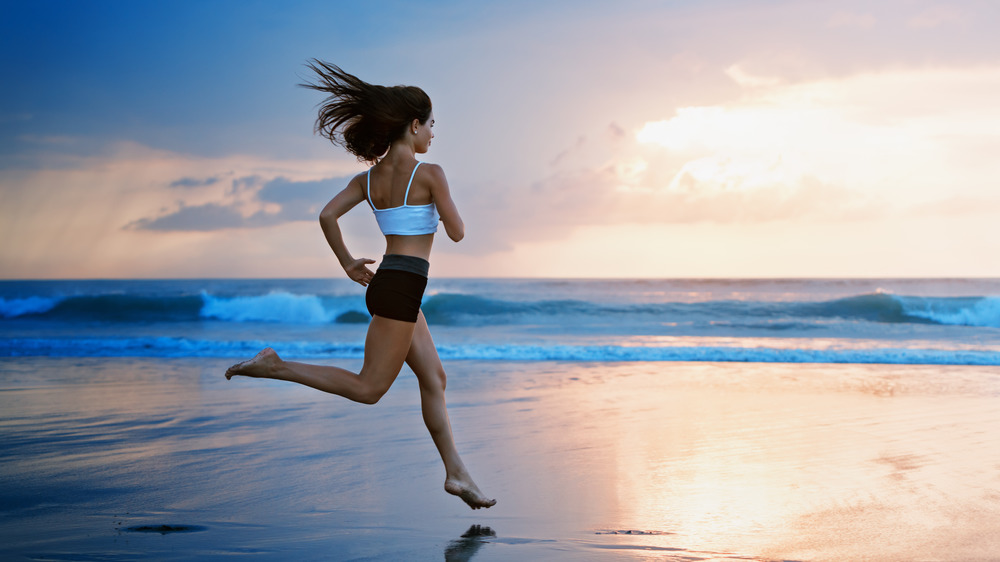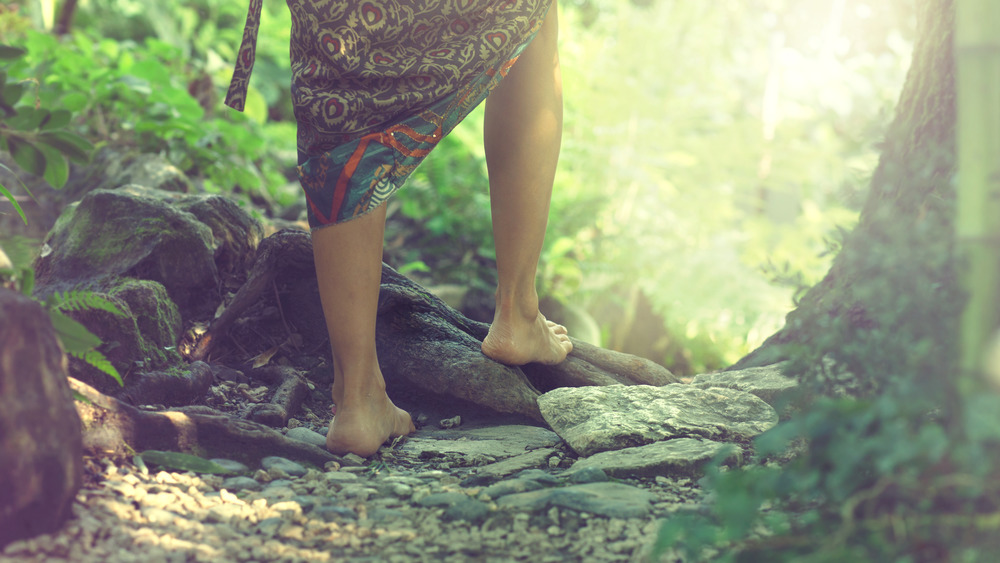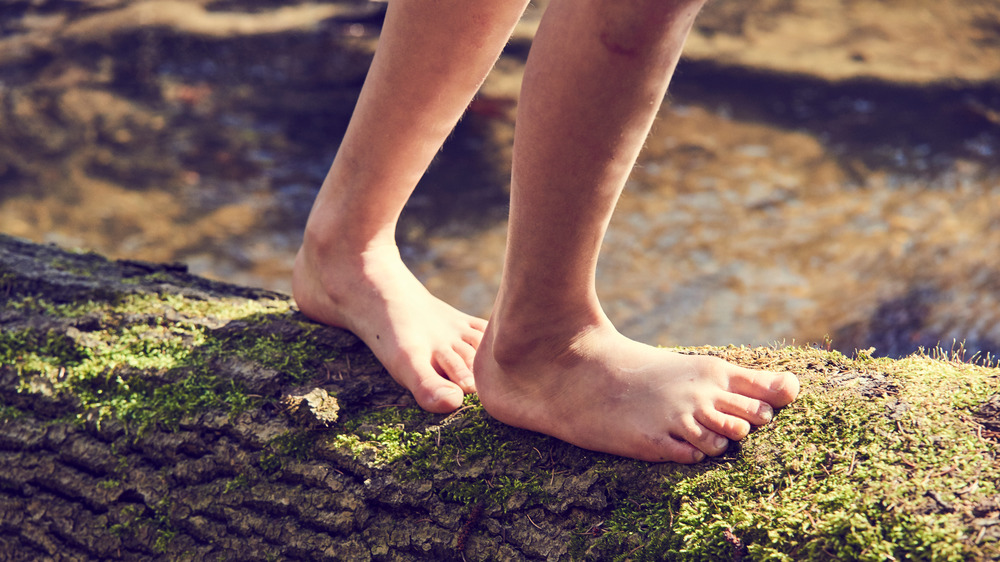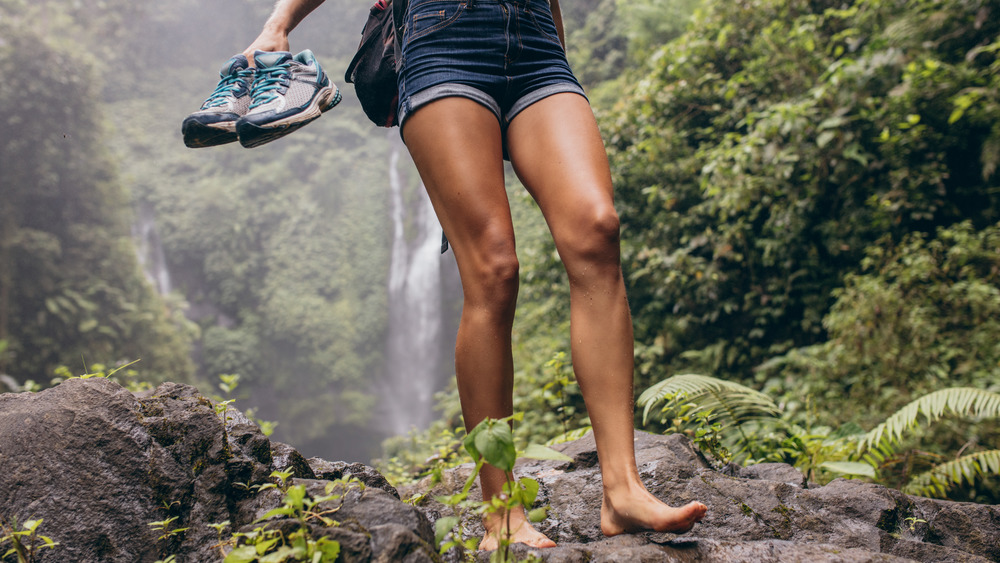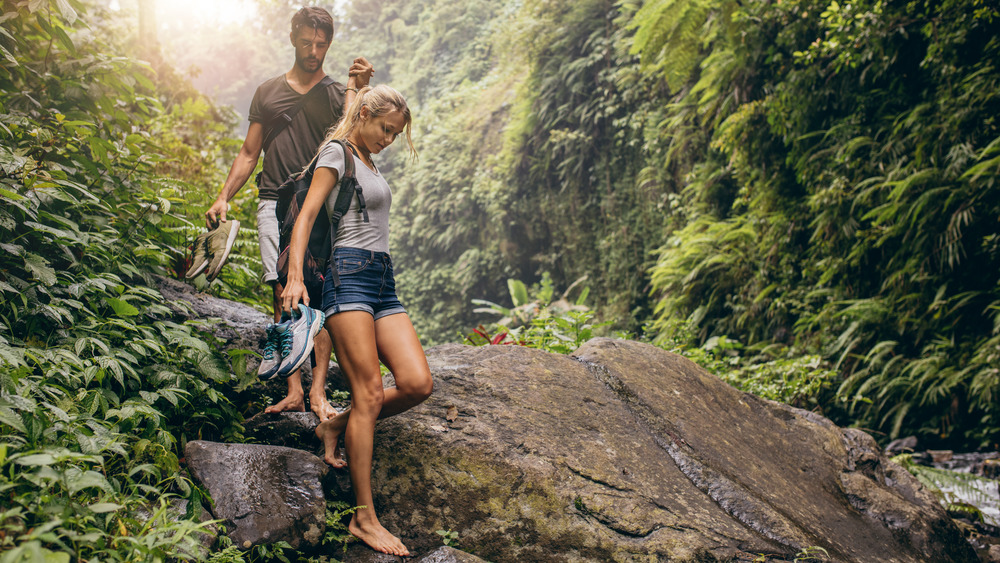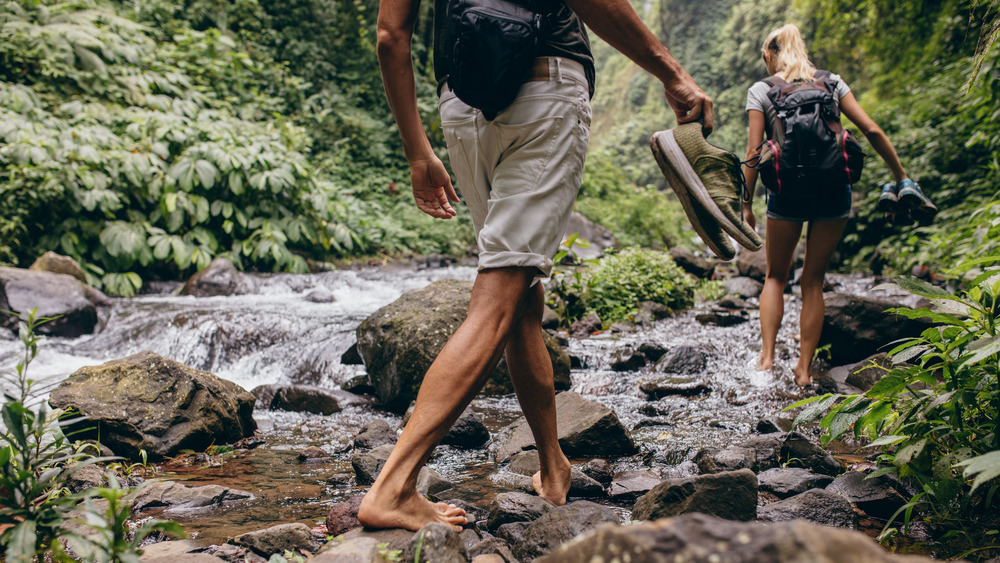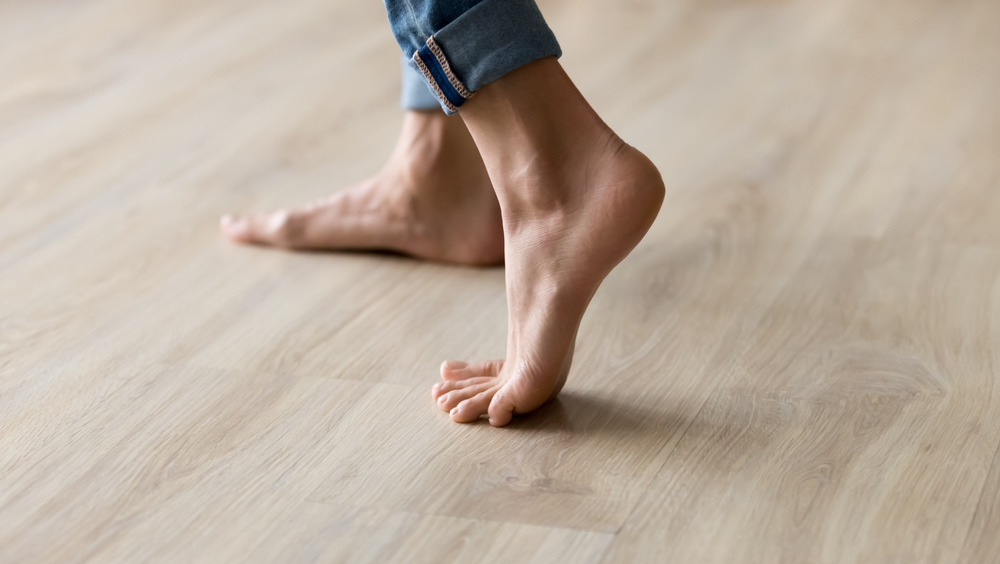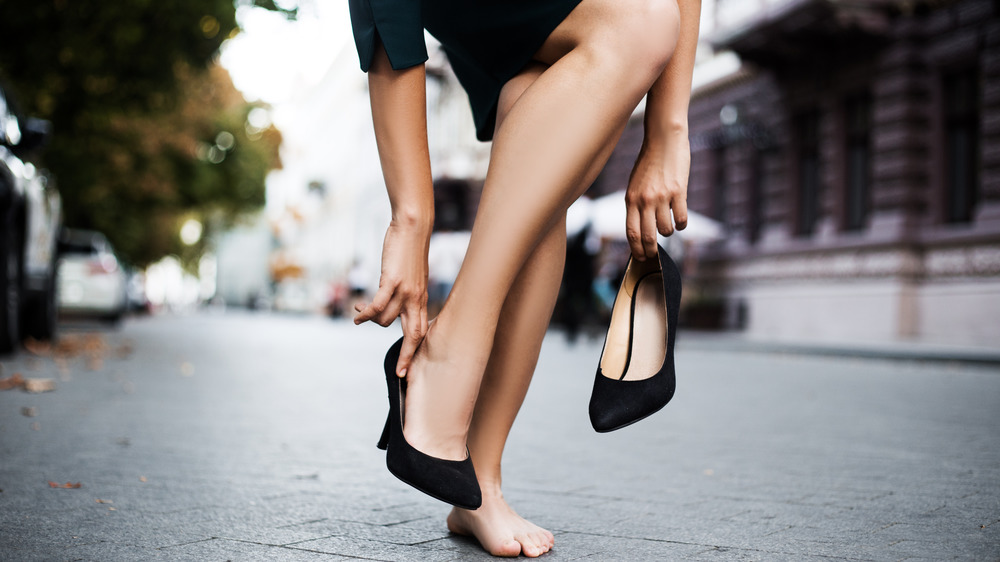What Happens To Your Body When You Stop Wearing Shoes
Ever wonder how some people (usually the ones donning harem pants and toting instruments) can casually strut around on scorching hot sand or blistering asphalt without doing that hop-skip-and-a-jump thing or playing Frogger to find patches of shade? Or how some rather alternative adventurers can trek across pebbled beaches, through forested mountains, and along craggy river banks blissfully barefoot? Somehow, they never seem to flinch.
The reality is that the more often you ditch the shoes, the easier it becomes to carry on without 'em, according to Healthline. And the better for you, physically and mentally! Why? Well, for obvious reasons, you'll rough up your feet with calluses. And calluses protect those pretty tootsies, toughening you up. But there's more!
Science supports all those tree-hugging hippies in their barefoot escapades, especially when there are so many different shoes that can do some serious damage to your feet. A burgeoning body of research suggests that walking sans the shoes (also known as earthing or grounding) has some pretty darn interesting health benefits. In fact, wearing shoes seems to be sole-crushing. Here's why you might want to leave your shoes at the door both when you're coming in and when you're heading out.
Earthing reduces electric fields induced on your body
Walking barefoot in the grass doesn't only feel freeing; it also does crazy things to your body — crazy good things. In fact, according to a study published in the Journal of Environmental and Public Health, earthing reduces the electric fields induced on your body. In other words: This helps to normalize your body's functioning.
"Environmental medicine focuses on interactions between human health and the environment, including factors such as compromised air and water and toxic chemicals, and how they cause or mediate disease," the researchers write. "Omnipresent throughout the environment is a surprisingly beneficial, yet overlooked global resource for health maintenance, disease prevention, and clinical therapy: the surface of the Earth itself."
That's right: The Earth's surface has a "limitless and continuously renewed" supply of electrons, and the global atmospheric electrical circuit maintains its negative potential. And "mounting evidence suggests" that the Earth's negative potential can create a stable internal bioelectrical environment for your body to operate the way it should. So walking around outside while barefoot, connecting to the Earth beneath your toes, isn't just hippy-dippy pseudo-science. This is real stuff.
Going barefoot reduces stress
Ever wonder why hippies seem to be so stress-free and chilled out? It may be partially due to the fact that so many of them are always wandering around barefoot. Yup, there's something about being barefoot that seems to reduce stress. Stress wreaks havoc on your immune system in a number of ways, according to a study published in the Malaysian Journal of Medical Sciences. From suppressing your immune system to increasing your risk of developing cancer, stress can really take a toll on your mental and physical health. (They do say that stress is a killer!) This means that walking barefoot can, essentially, kinda-sorta save your life.
The study, "The biologic effects of grounding the human body during sleep as measured by cortisol levels and subjective reporting of sleep, pain, and stress," published in the Journal of Alternative and Complementary Medicine, measured diurnal rhythms in cortisol in subjects who were sleeping on conductive mattress pads grounded to Earth. And it found that being grounded to Earth actually made them a whole lot less stressed out. And the same goes for walking directly on the Earth with bare feet.
Grounding reduces cardiovascular risk and cardiovascular events
It's no secret that kicking your shoes off and letting your feet free feels like a breath of fresh air. But did you know that grounding actually decreases your risk of developing cardiovascular disease, too? According to a study published in the Journal of Alternative and Complementary Medicine, "grounding increases the surface charge on red blood cells and thereby reduces blood viscosity and clumping." This makes grounding "one of the simplest and yet most profound interventions for helping reduce cardiovascular risk and cardiovascular events."
Considering the fact that heart disease is the leading cause of death for both men and women in the United States, according to the Centers for Disease Control and Prevention, walking barefoot doesn't sound so bad. One person dies every 36 seconds in the country from cardiovascular disease, but if fewer people wore shoes, maybe that statistic wouldn't be quite as horrifying.
Earthing regulates the nervous system
It can take time to get used to walking around barefoot. And, during that period, it can be uncomfortable — perhaps even painful, at times. But they say pain is beauty, right? And there's definitely beauty in an improved nervous system. Earthing regulates the nervous system, according to a study published in the journal, Medical Hypotheses. It does so through a process called neuromodulation, which electronically or chemically stimulates, modifies, and regulates the nervous system. Direct electric currents from the Earth to the feet can induce neuromodulation, which can change the electric environment of your body. So, when you walk barefoot, these electric currents move from the Earth through the soles of your feet.
"Contact with the Earth (earthing) directly or via a conductive wire plays role as a neuromodulative factor, probably primary, which enables the nervous system to be better adapted to the demands of organism and ambient environment," the researchers report.
Earthing resolves chronic inflammation
Chronic inflammation can be unbearable. It's also referred to as "slow, long-term inflammation," as it lasts for prolonged periods of time — sometimes several months to even years on end, according to the National Center for Biotechnology Information. Typically, the extent of chronic inflammation varies with the cause of the injury and your body's ability to repair the damage. Whatever the case, there's one surefire way to better overcome chronic inflammation. And, you guessed it: That's walking barefoot.
According to a study published in the Journal of Alternative and Complementary Medicine, "current biomedical research has led to an inflammation hypothesis that is establishing chronic inflammation as the culprit behind almost every modern chronic illness." But, according to the researchers, earthing can totally change the game. Yup, walking around without any shoes, both inside and outside, can help to reduce chronic inflammation.
How? Well, earthing restores and maintains the natural electrical contact between the human body and the Earth. And the research purports that free or mobile electrons from the Earth can resolve chronic inflammation because they serve as "natural antioxidants." It's a simple solution for a complex, chronic issue.
Walking barefoot is linked to reduced pain
Walking around barefoot is linked to reduced pain in the muscles and joints, according to a study review published in the Journal of Environmental and Public Health. The research shows "reconnection with the Earth's electrons has been found to promote intriguing physiological changes and subjective reports of well-being," including everything from better sleep to reduced pain. Whether you're walking barefoot outside, sitting outdoors, or "sleeping indoors connected to conductive systems that transfer the Earth's electrons from the ground into [your] body," earthing is linked to better health.
In fact, in a blinded pilot study published in the ESD Journal, the researchers found that people who suffered from sleep disturbances and chronic muscle and joint pain actually felt a lot better after sleeping on conductive carbon fiber mattress pads connected to the Earth. And walking barefoot on the Earth has the same effect.
There's pain reduction also because you're using your whole foot to walk when you're barefoot, compared to when you have supportive shoes on. Shoes mean your feet don't have to work so hard, but that only puts more pressure on active muscles and your joints.
Earthing is known to moderate heart rate variability
Though not often talked about, your heart rate variability is important. Harvard Health calls it a "new way to track well-being," after all. Simply put, it's a measure of the "measure of the variation in time between each heartbeat." If you have heart palpitations, you can usually tell that the time between heartbeats can be different. This variation is controlled by the autonomic nervous system (ANS), which is a part of your overall nervous system. It regulates your heartbeat, blood pressure, breathing, digestion, and more. It's also responsible for your body's fight-or-flight responses.
Wandering around barefoot does something to the heart. But it doesn't just make your heart happy. It moderates your heart rate variability, too. According to a study review published in the Journal of Environmental and Public Health, "grounding may also improve heart rate variability (HRV), a measurement of the heart's response to ANS regulation." So getting your heart in check may be as simple as kicking off your shoes and going for a stroll in the great outdoors without them.
Grounding can improve your glucose regulation
Your blood sugar, also known as glucose, is the main type of sugar that is found in your blood, according to Healthline. It comes from the foods that you eat, and it provides your body's body with energy. But you can have a blood sugar level that's too high or too low. And, if you do, it can take a devastating toll on your health.
Glucose regulation is critical to the maintenance of your body, according to a wealth of research, like the study "Sugar for the brain: the role of glucose in physiological and pathological brain function" published in Trends in Neurosciences. Because your brain doesn't have energy storage on its own, it needs a consistent flow of glucose, even when you're resting.
Fortunately for you, regulating the glucose in your body can be as simple as walking around barefoot. That's correct: Grounding can improve your glucose regulation, according to a study review published in the Journal of Environmental and Public Health.
Walking barefoot improves your balance over time
Walking around barefoot can improve your balance over time, Dr. Andrew Wojciechowski, ND, writes for Correct Toes. "When we are barefoot, we receive a massive amount of sensory feedback from our feet — far more than when we are in overly-supportive and overly-cushioned shoes," he explains. "We receive increased information from the foot about its position in space, the texture of the ground and muscle tension."
Being barefoot enhances the homunculus of the foot in the brain, he adds. This leads to better balance and improved motor control. On the contrary, wearing too-supportive (yes, that's possible!) shoes can mean that the sensory homunculus becomes underdeveloped. Wojciechowski's comments are supported by research published in the European Journal of Applied Physiology.
"When someone is barefoot regularly, the sensory feedback from the foot becomes more detailed and refined, allowing the foot and brain to delineate small changes of sensory stimuli," he says. "The result is better control of motor function and balance. This is especially important as we age because the loss of balance is the top reason for falls in the elderly."
Going shoeless helps builds your brain's building neurological pathways
Listen, we're not trying to convince you that going barefoot is the way to go. But we can't deny science. Ditching shoes can ultimately help your brain build neurological pathways and enhance your sensory experiences. It makes sense, after all. Think of all the nerve endings you have on the bottom of your feet, according to Scientific American. Dr. Andrew Wojciechowski, ND, who writes for Correct Toes, puts it this way: "Add the changes in brain function to the long list of reasons to consider ditching constrictive shoes and allow your feet (and brain) to feel more."
Rae Pica, an early childhood education keynote speaker and consultant agrees. She talks about the benefits of starting children off with no shoes on her blog. "Turns out the feet are the most nerve-rich parts of the human body, which means they contribute to the building of neurological pathways in the brain," she adds. "Covering them in shoes, therefore, means we're eliminating all kinds of opportunities for children's brains to grow new neural connections."
Embracing bare feet improves anatomical alignment
Embracing your bare feet is said to improve your anatomical alignment, according to research published in the Journal of Inflammation Research. According to Medical Daily, the same can be said for your posture. When you walk or run on your bare feet, using all of your feet bones and muscles in the way that they were designed to be used, your body operates the way it was always meant to operate — you know, before shoes were ever a thing. When you have shoes on, however, your feet don't align as well, and they also don't send the same senses back up to your brain.
Dr. Andrew Wojciechowski, ND of Correct Toes, also supports these claims. "Along with the increased muscular strength, the enhanced circulatory flow and improved anatomical alignment, going barefoot has very tangible benefits on the brain and the nervous system," he writes. "This results in improved balance, better motor control and more enjoyment."
Being barefoot more often builds toughness
Rae Pica, an early childhood education consultant argues that being barefoot builds toughness. People (and kids, in particular!) need this kind of grit to get through this world. Walking barefoot both roughens up the feet and helps to fight off germs. "Being barefoot actually toughens up the bottom of the feet, so unless children are walking through a construction site full of nails, the likelihood that they'll injure themselves is slim," she writes in her blog.
She also dives into perhaps the biggest worry that many parents and teachers have about setting children's feet free: Germs. "One common concern is that kids will contract germs by going barefoot," she adds. "But our skin is designed to keep pathogens out. We're much more likely to become ill from touching something with our hands, which are in contact with so many things during the course of a day. I'd hate to think we'd keep kids in gloves all day to prevent germs!"
Walking without shoes activates foot reflexology zones
Walking without shoes activates foot reflexology zones that benefit your mental health, too, according to a study published in Evidence-Based Complementary and Alternative Medicine.
"The idea behind reflexology is that some foot zones correspond to some anatomical body parts," reveals Relax the Feet, a reflexology center. "It is believed that applying pressure to such points can promote healing in some parts of the body. Reflexology is aimed at promoting health in body organs and releasing stress from the body."
In this type of therapy, particular points on your feet are mapped to correspond to various body parts and systems. A therapist will incorporate stroking, massaging, and other pressure techniques to each point to unblock energy and release tension. As the study published in Evidence-Based Complementary and Alternative Medicine adds, "foot reflexology may be recommended as a complementary intervention to improve our depression, anxiety, and sleep quality."
Walking barefoot just plain feels great on the feet and body
According to Healthline, there are a whole host of benefits to walking barefoot, from "better foot mechanics" to stronger legs. When you walk in shoes, you'll have a greater tendency to put your foot flat, hardly challenging your fore- and mid-foot muscles. Walking barefoot puts less strain on the joints by utilizing all of your foot muscles, according to Holmes Places Medical Center.
But, let's face it: Walking barefoot in the great outdoors just plain feels good (unlike bunion-inducing pointed-toe shoes). Name something better than the feeling of grass beneath your feet or sand between your toes, we'll wait.
"There is pure enjoyment in being able to feel and connect with various textures and surfaces," writes Dr. Andrew Wojciechowski, ND of Correct Toes. "Being barefoot on the beach, in the grass or on the rocks of a riverbed is immensely pleasurable and provides additional physiological benefits, too."

